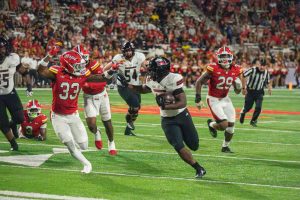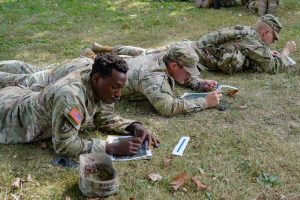AP VoteCast: Democrats still seeking candidate to unite them
February 13, 2020
WASHINGTON (AP) — Democrats are still searching for a presidential front-runner.
No single candidate following the Iowa and New Hampshire contests has demonstrated undeniable strength, suggesting the race remains fluid with loyalties in flux, according to AP VoteCast.
The polling indicates voters are gaming out a series of overlapping and clashing impulses, trying to judge who among Sen. Bernie Sanders, former Mayor Pete Buttigieg, Sen. Amy Klobuchar, Sen. Elizabeth Warren and former Vice President Joe Biden would be most competitive in November against President Donald Trump.
The survey did not include former New York Mayor Michael Bloomberg, who was not on the ballot in New Hampshire.
Moderate voters, who made up a majority in New Hampshire, splintered their votes, allowing a young and more liberal coalition to carry Sanders to a narrow victory.
But AP VoteCast shows that New Hampshire voters who fit the profile of Biden’s supporters in Iowa gravitated toward Klobuchar and, to a lesser extent, Buttigieg — helping lead them both to strong showings in the state.
Conducted for The Associated Press by NORC at the University of Chicago, AP VoteCast is a wide-ranging survey of more than 3,000 Democratic primary voters in New Hampshire.
The Democratic nomination and the outcome of the 2020 election will ultimately depend on how a disparate group of voters find a way to come together.
KLOBUCHAR
After all the debates and town halls, it was mostly a last-minute decision to vote for Klobuchar for those in New Hampshire.
A stunning 56% of her supporters said they made up their minds in the days before Tuesday’s primary. As in Iowa, her voters tended to be older than 45 and have college degrees. Most defined themselves ideologically as moderate or conservative.
But her standing among these groups appeared to improve from Iowa following her solid debate performance last week in New Hampshire. “If you are tired of the extremes in our politics and the noise and the nonsense, you have a home with me,” Klobuchar said.
Still, there were signs that her backers could rally behind Buttigieg as the primary contest spreads to states where Klobuchar’s campaign has limited infrastructure.
A wide majority of Klobuchar voters, 80%, said they would also be comfortable if Buttigieg became the nominee, and 41% identified him as their second choice.
BUTTIGIEG
The Midwesterner enjoys broad support, just not among liberals.
Compared with other top candidates, his backers look more like New Hampshire Democratic voters overall by age and education. He also nabbed somewhat higher support in New Hampshire than in Iowa among moderate and conservative voters without a college degree, after that group gave him and Biden comparable support a week ago.
But about 8 in 10 Buttigieg supporters self-identified as moderate or conservative. Roughly three-quarters thought it would be more difficult for a strongly liberal Democratic nominee to beat Trump in November.
Buttigieg supporters don’t put much stock in experience, not a surprise considering the 38-year-old’s time as an elected official consists of two terms as the mayor of Indiana’s fourth-largest city.
Only a quarter of Buttigieg supporters said it is very important for a Democratic nominee to have “the right experience,” compared with half of Klobuchar supporters and majorities of Biden, Warren and Sanders supporters.
Similar to Klobuchar backers, a large share of Buttigieg supporters, 72%, said they would be satisfied with her as the nominee. But somewhat fewer of them, 29%, named her as their second choice.
SANDERS
Four in 10 of Sanders’ voters said they knew all along that they would back him, evidence of his strong core of support.
His voters were disproportionately young and very liberal. A majority of them did not hold a college degree. Sanders was also the top choice of nonwhite voters and LGBT voters — cohorts that each made up a fairly small share of the electorate.
Sanders’ supporters think the best way to beat Trump is by outflanking him on the left on universal health care, free college and other matters, rather than charging down the middle. Nearly 6 in 10 said that a strongly liberal candidate would make no difference or even help him against Trump.
The majority of New Hampshire Democrats feel differently, with nearly two-thirds saying a liberal candidate would face a tougher battle against Trump.
If Sanders failed to win the nomination, majorities said they would find Warren or Buttigieg acceptable. But only 33% felt satisfied by a Biden nomination and 48% said so for Klobuchar.
WARREN
Warren saw her overall support tail off from Iowa to New Hampshire, where she received less than 10% of the total vote. But her coalition looked roughly the same: mostly women and mostly college graduates. Put it all together and close to half of her supporters were women with a college degree.
A wide majority were liberal, including 44% who called themselves “very liberal.”
Nearly 6 in 10 Warren supporters said it’s very important for a woman to be elected in their lifetimes — far more compared with other top contenders’ supporters, including Klobuchar’s.
BIDEN
They’re older. They’re more moderate. They’re nostalgic for the presidency of Barack Obama. And in New Hampshire, they were a distinct minority.
The former vice president placed fifth, validating his assertion at the state’s debate that he would take a “hit.” Biden is betting heavily that he will fare better in the more racially diverse contests in Nevada and South Carolina.
In New Hampshire, roughly 8 in 10 Biden backers were 45 or older. About half had a college degree.
Compared with backers of other candidates, a higher share of Biden supporters said a candidate who would restore the political system to how it was before Trump’s administration was more important than one who would fundamentally change Washington.
Nearly two-thirds said it was very important for the Democratic nominee to have “the right experience” and to work across the aisle.
———
AP VoteCast is a survey of the American electorate conducted by NORC at the University of Chicago for The Associated Press and Fox News. The survey of 3,111 voters in New Hampshire was conducted for seven days, concluding as polls closed. The margin of sampling error for voters is estimated to be plus or minus 3.0 percentage points.






